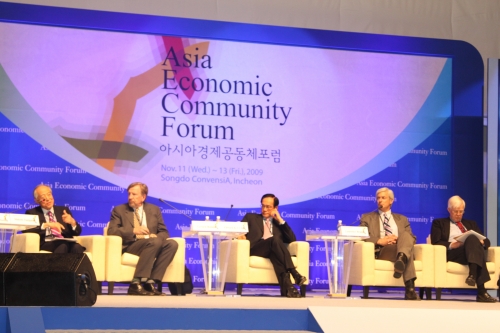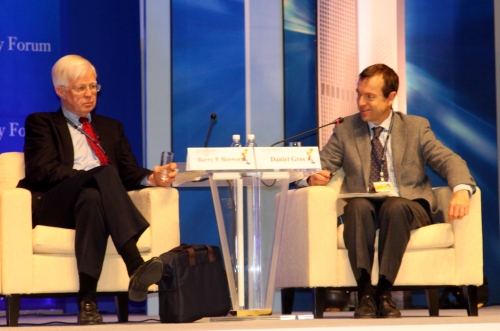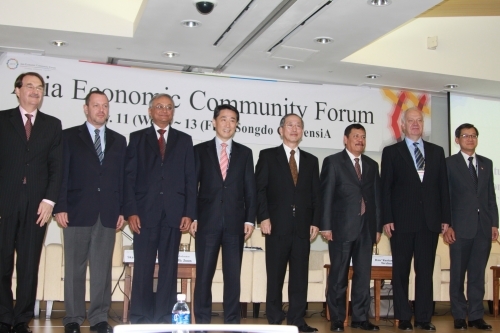
One of the many speakers present at the Asia Economic Community Forum was Gerard Roland, a professor at UC Berkeley. In a debate about 21st century capitalism, he shared his opinions with everybody. The introduction of the 20th century started out with economic prosperity and peace, but in the latter stages sparked two of the bloodiest wars in history. Ideas of government were constantly arising, but the capitalistic system outlasted all of them. Totalitarian regimes such as that of the Nazis and Communism are no longer a threat to take over as a solid political system. In his speech, he stated, "There is neither a political system nor an economic system presented that can compete with democracy and capitalism."
So where does that lead us in the 21st century This will be a showing of increasing numbers of democracies and an increased number of capitalistic countries. According to the Polity database, the number of democracies have largely been increasing from 1946-2008, while autocracies are declining. He concluded by saying, "We must learn to live in a world with non-converging cultures. More democracy will not change this. Non-converging cultures will be a factor in the slow spread of genuine democracy."
A More Independent IMF for the 21st Century
Daniel Gros, director of the Centre for European Policy Studies, spoke about creating a more independent system for the International Monetary Fund (IMF).
His opinion on the current IMF is that it needs more resources to predict future crises and that the system has to be made more independent.
The IMF crisis that occurred in 1997 affected many lives in Korea and Asia. Daniel Gros stated, "The current structure of the system does not create adequate informational and analytical content. They simply do not have access to the relevant information to detect early warning signals effectively. Secondly, there has been a lack of independence and impartiality."
Critical comments were made by this speaker, and his hope is that the IMF is able to detect early warning signals more effectively to prevent financial crises. He states that the strategy is a 2 step strategy that includes IMF early-warning capacities and increasing IMF independence. He concludes by saying, "I argue that the IMF can become an effective watch dog for international financial stability only if it's governance is changed."
Lesson of the Financial Crisis

Barry P. Bosworth, Senior Fellow of Brookings Institute, USA, shared his opinion about the global crises in Asia solutions and a new paradigm.
As some of the other panelists stated, he agreed that a current financial crisis was triggered by excess risk-taking in the market for subprime mortgages. He said, "As such it represents a major failure of US financial regulation. However, while the failures of the mortgage market were the proximate causes of the crisis, it was also fueled by the excess global liquidity that can be traced to the imbalances of capital and trade flows between the US and Asia, and an excessively easy US monetary policy. It reflects not a failure of capitalism but a failure of policy."
The United States was the most impacted by the crises because it was at the center of all three problems that created the crisis: a large and persistent external imbalance that pumped financial capital into US markets, an overly expansionary monetary policy that ignored the growing evidence of speculative activity in asset market, and a foolish reliance on the self-regulation of financial markets.

The US policy response has three central aspects of a monetary policy focused on the provision of abundant liquidity, a large fiscal stimulus aimed at arresting the collapse of aggregate demand, and reconstruction of the financial system. Bosworth believes that these policies have worked relatively well in stopping the economic collapse and the focus is now shifting to the recovery phase and the need to address the longer-term issues that precipitated the crisis. This will be difficult, according to Bosworth, because many of the short-term actions needed to stop the collapse were directly opposite to the measures that are necessary for a long-term rebalancing of the US economy. In the long run, the United States needs to dramatically raise national saving, reduce its reliance on the inflow of resources from abroad, and expand investment in its infrastructure, he said.
He concluded by saying that in effect, the United States is being pushed to follow the lead of other countries that have experienced financial crises in focusing on an export-led recovery. However, despite joint criticism of the US imbalance, individual Asian economies seem to have concluded that export promotion continues to be in their own best interests, and that the major lesson from the crisis is that their reserves were not large enough. This is a prescription for increasing trade conflicts in the future.
Asian Community is Already Started
"Current efforts to form a EU-style Asian community are not new. Such efforts have already started. Asia is so big that sub-regional groups, such as ASEAN, South Asia, Central and West Asia, have already made efforts to build blocs of their own under the motto Creating One Asia Together," Kim Hak-su, chairman of the Asia Economic Community Foundation and Asia Economic Community Forum continued, "The ESCAP looks at Asia as a whole. The first consideration for an Asian community is how to efficiently unify Asian economies. This is the first stage for the process."

Voices of Ambassadors at ACEF toward Asian Economic Community
Ambassadors garnered together at the AECF to share each country's perspective on Asian economic integration.
Sam Gerovich (Ambassador of Australia to the Republic of Korea)
The contribution of Australia is important to constructive trade in Asia. Australia's integration to Asian economy has grown since 51% of our total trade was made with Asia in 2008. We have reliable and efficient energy source supporting growth of East Asia including Korea. However, Asian economy is largely based on trade within Asia. APEC achieved to reduce the trade barrier, and we are pursuing comprehensive free trade agreement with large number of countries. Asian Pacific Community will continue to grow and it is a significant opportunity but also challenge. Open market and open investment is the key to development of integration within Asia.
Ted Lipman (Ambassador of Canada to the Republic of Korea)
Asia stands out as the most dynamic region. Economic and political forces are shifting to relationship due to impact of globalization. Also, the cultural factors like Korean wave, 'Hallyu', created a climate that helped bring many countries together. However, to build stability and prosperity, new architecture is needed with cooperation. Today we are mutually interdependent to each other. By avoiding conflicts, we have prosperity by relying on each other. Although Asian countries desire to have economy autonomy, the current financial crisis imposed the variety of critical challenges. Our common goal of economic prosperity cannot be achieved by drifting apart. The future growth plan should include all players around the world. Canada is ready to cooperate and shape the goal with Asian Pacific Community.
Skand Ranjan Tayal (Ambassador of India to the Republic of Korea)
Today there is a high expectation in Asia as the region to pull the economy out of the global crisis. 6 members of G20 are also members of East Asian Community and India is working for greater integration of East Asian Community. India is close to Southeast Asia sharing similar cultures. We are building programs for Asian economy through investment in infrastructure, strengthening social benefits and education. India values comprehensive economic partnership in East Asia including 10 members of ASEAN countries. We lead partnership with excellent road map for economic and financial integration. We also need to work together for climate changes. Asian Economic Community will result prosperity with great partnership.
Dato' Ramlan bin Ibrahim (Ambassador of Malaysia to the Republic of Korea)
The vision of East Asian community is shard with common future goal - peaceful, stable, prosperous, and progress region. The work is in progress, and it is no longer idealism. To sustain the momentum for the development of East Asian Community, we can achieve through higher agreement consultation. The commitment is the main driving mechanism for the East Asian Community cooperation. Asian Community will play role as a hub for cooperation. What we need to be done is political commitment for establishment of Asian Community.
Konstantin V. Vnukov (Ambassador of Russia to the Republic of Korea)
Two-thirds of Russia belongs to Asian continents. We are greatly interested in Asian Pacific integration process. Russia is member of many regional organizations including one of the most influential organizations, Asian Pacific Economic Community. Russia wants to directly involve in regional integration. We have a lot to offer - Biological resources, fresh water, science and technology, and intellectual potential as well as natural resources. We are open to diverse and mutually beneficial integration of Asian Pacific region. We will do everything to ensure APEC summit to be productive and high quality.
(Ambassador of Singapore to the Republic of Korea)
Singapore position on trade and regional cooperation is very clear because we are small country with no natural resources. We try to trade with as many countries as possible. The trade within Asia has increased a lot. ASEAN association is a group of 10 countries comprising over 570 million people which is larger than EU. We have a vision to form a single market in 2015. We will use other economic communities to promote further regional integration. Economic integration is not just about reducing barrier, setting regulations, and investment, it is about connecting people. We need a road, railway, shipping, and IT. Asian leaders are discussing the greater connectivity. The global economy is shifting Asia and Asian Regional Integration with open basis will continue to elevate.


